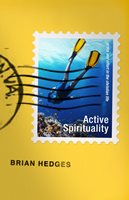Reviewed by J. Stephen Yuille
Last month, Shepherd Press sent me Brian Hedges’ Active Spirituality: Grace and Effort in the Christian Life. I read it in one sitting (while waiting for a flight – yes, delayed). The book made an immediate impression on me – an impression that was confirmed several weeks later when I perused it at a slower pace. Let me explain why.
Context
For starters, the book is timely. Over the past few months, there has been a great deal of discussion (even debate) within Reformed circles concerning the relationship between justification and sanctification, faith and works, grace and effort, the indicative and the imperative. Hedges speaks to the entire discussion with clarity and accuracy, noting that “the church veers north when she loses her wonder of the freedom of grace [… and] south when she loses her wonder of the power of grace” (p. 10). But when we maintain our wonder of both, and remember that the gospel is about what Christ does for us and in us, we stay on course and avoid the pitfalls of legalism and antinomianism.
Real Life
Second, the book is experimental. The Latin verb experior means to know by experience. Experimental theology, therefore, is that which aims to apply divine truth to the whole range of personal experience. That’s precisely what Hedges seeks to do in this book. He explains, “I’ve not written this book simply because Christians need balanced theology (as important as that is) but because there are real threats and dangers to my life and faith, and to yours. I want to be standing in Christ ten years from now. And I won’t be unless (by God’s grace) my spirituality is active” (p. 13).
I really appreciate this experimental emphasis, as I’m increasingly uncomfortable with the common notion of “pure” theology – that is, the idea that we can study theology as an academic discipline without any reference to its situational application. I’m reminded of Martyn Lloyd-Jones’ observation regarding the Puritans (which might come as a surprise to those who’ve never read the Puritans): “There is nothing that they more deplored than a mere academic, intellectual, theoretical view of the truth” (Martyn Lloyd-Jones, The Puritans: Their Origins and Successors [Edinburgh: Banner of Truth, 2002], 55). Hedges’ writing most certainly isn’t anti-intellectual – not by any means. My point is simply this: he doesn’t handle theological motifs in the abstract, but demonstrates how integral they are to our spiritual journey.
On Target
Third, the book is balanced. The concurrence of the divine and human in the realm of spiritual activity perplexes many of us, but Hedges proves a safe guide. He writes, “The Christian life is called a walk, a race, a contest, and a fight. We are told to run, to wrestle, to watch, and to stand. And the victors – those who conquer and overcome – receive great promises whereas terrible warnings go to those who grow sluggish and neglect the great salvation secured for us by Jesus” (p. 13). Despite this emphasis on human activity, Hedges is careful to stress that our efforts are ineffectual apart from the sovereign work of the Holy Spirit. As he repeatedly makes clear, active spirituality involves working “out” what the Holy Spirit has worked “in” (Phil. 2:12–13).
Engaging
Finally, the book is unique. How so? It consists of thirty-one letters between two believers: Chris and Brian. Hedges gives two reasons for choosing to teach theology through letters. First, he views it as “a fun and creative approach” (p. 14). Second, he believes it reflects the reality of “our faith journeys,” which “are not linear or direct from infancy to maturity,” but “are circuitous and roundabout, with lots of detours and obstacles, punctuated by backtracking, rest stops, and significant delays on the side of the road” (p. 14).
What particular issues do the letters address? Here’s a sampling. What does it mean to walk with God, turn to God, and hope in God? How do we deal with the spiritual blahs? What leads to spiritual neglect, backsliding, and apostasy? What role do works play in salvation? What is intervening grace? How do we fight the good fight? What does it mean to enjoy God in everything? How do we obtain and maintain assurance? How do we overcome weariness? Why is the church important to spiritual growth? What is gospel humility? What does it mean to rest in Jesus and look to Jesus? What is so dangerous about self-trust?
Hedges’ handling of these issues is very helpful, and serves as a modern-day example of Puritan casuistry – the art of dealing with “cases of conscience” through self-examination and scriptural application.
Conclusion
For the above reasons, I recommend Active Spirituality to you. In addition to edifying and encouraging all readers, it will prove a useful resource for pastors, as it provides valuable insight into how to minister to God’s people as they struggle with common spiritual ailments.
As already mentioned, I read the book in one sitting, but I don’t recommend you do the same. An ideal approach would be to read one chapter per day, allowing ample time for reflection and application.
Dr. J. Stephen Yuille is Pastor of Grace Community Church, Glen Rose, TX, Director of Baptist Studies at Redeemer Theological Seminary, Dallas, TX, and Book Review Editor for Spirituality and Christian Living here at Books At a Glance.
